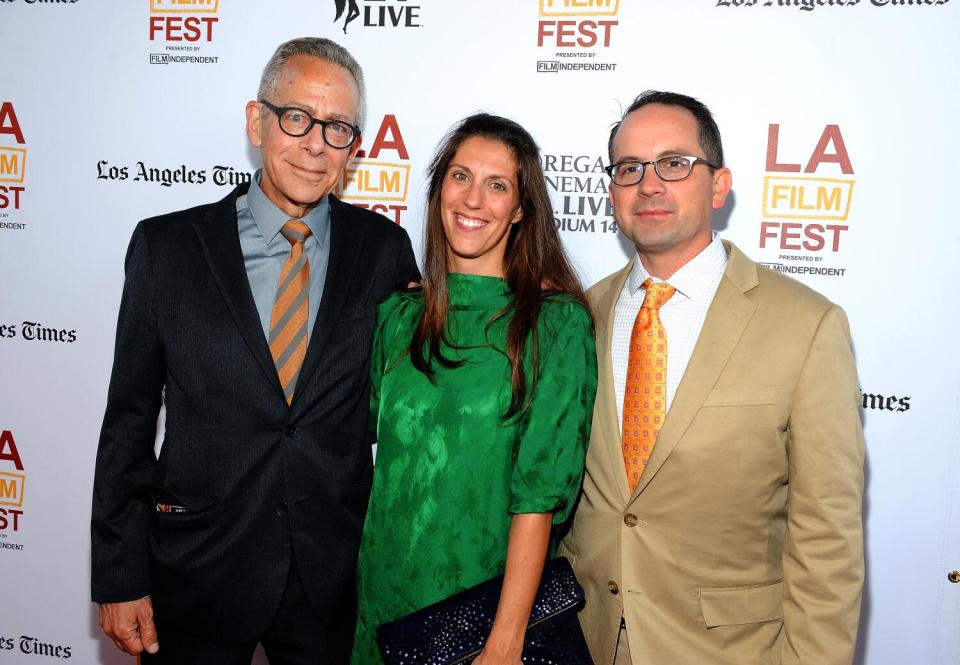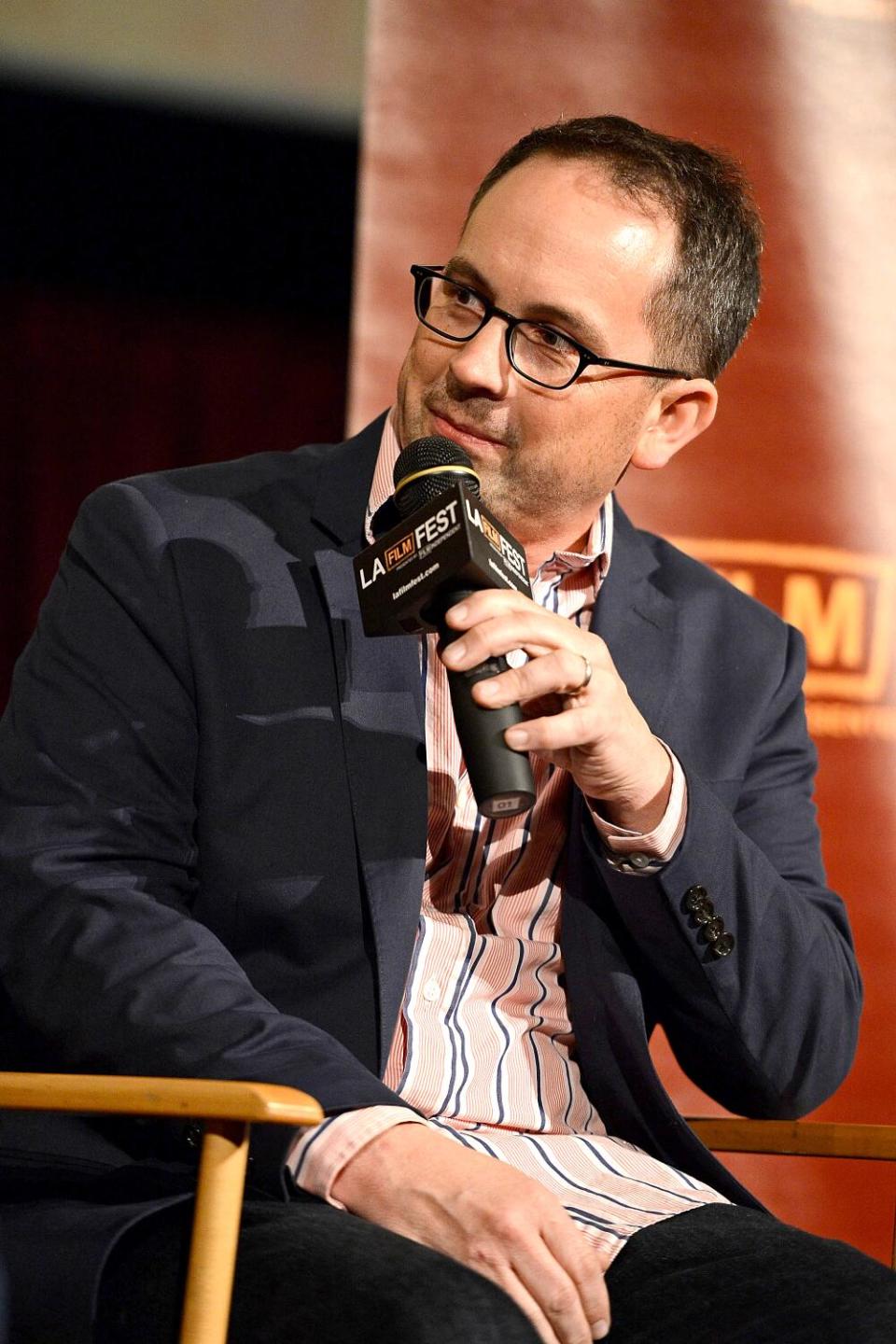The tightknit independent film community was shaken this week by the unexpected death of veteran programmer, curator and exhibitor Doug Jones at age 53.
Most recently, Jones was deeply involved in helping relaunch Vidiots as a movie theater and video store, one that instantly became a vital hub for film culture in Los Angeles. He was also a consulting programmer for the South by Southwest Film and TV Festival. Jones worked for 12 years with Film Independent from 2002 to 2014, rising to associate director of programming at the now defunct Los Angeles Film Festival.
Jones’ death was confirmed on Nov. 1. Vidiots suspended its programming from Nov. 2 to Nov. 5, describing Jones as “a beloved and indispensible member of the Vidiots family and a cornerstone of the global film programming community” in a statement posted to social media. As word of his death circulated among the filmmakers, programmers and industry professionals who knew him, the outpouring of grief and emotion was remarkable for its intensity and sincerity.
Though Jones never held the top position at any festival (his unassuming personality made him an unlikely figure for the spotlight), he was exactly the sort of person who makes the independent film community and the interconnected universe of film festivals run.
Read more: The return of Vidiots could alter L.A.’s moviegoing map for good
In recent weeks he could be found introducing screenings at Vidiots, catching up with old friends and filmmakers in the lobby and putting plans in motion for his next inspired repertory program, always with a knack for beloved classics and unearthed gems. Jones was known for passionately and sincerely sharing his knowledge and enthusiasm with a quiet, steady presence.
Maggie Mackay, executive director of Vidiots Foundation, recalled to The Times that she and Jones met in 2003 while working at LAFF. “He was gentle and reserved, but also one of the most energetic, playful, warm people on Earth — the last to leave a party, the first to talk movies or music with a stranger in a crowded room,” she said. “This duality, and a deep affection for art and humanity, were key to his building a massive creative community around him; he is the center of a web of filmmakers, artists, and programmers who, more than anything, are friends.”
Mackay noted that, though Jones’ job at Vidiots was as a film buyer and programmer, “that title is deeply limiting.”
“Without Doug, there might not be a second life for Vidiots, and there certainly would be no movies at the historic Eagle Theatre,” she added.

Palm Springs International Film Festival lead programmer and critic David Ansen, who worked closely with Jones for five years as artistic director of LAFF, said in an email to The Times that he always learned from Jones’s opinions on movies. “He didn’t traffic in received opinions; his were always fresh, personal, whip-smart. His knowledge was encyclopedic; his appetite for films — the high high and the low low — voracious,” Ansen wrote.
At this year’s Toronto International Film Festival in September, the two caught up as Jones was attempting to watch an ambitious eight movies in one day. “I quit at four,” recalled Ansen. “Nobody would call Doug demonstrative: he played it close to the vest, but under the wry, reserved, deadpan surface was a fierce, passionate soul. It came out loud and clear at karaoke, where he was a master. He was a joy to work with, a friend whose loyalty you never had to doubt, one of the rare people you always looked forward to seeing. The loss is enormous.”
Born in Boulder, Co., Jones was raised in South Dakota and Minnesota. His first job at age 14 was at a movie theater in Sioux Falls, S.D., and he went on to earn a degree in film studies from Metropolitan State University in St. Paul, Minn. A lifelong movie lover with an affinity for the unusual and obscure, he worked at the University Film Society in Minneapolis under Twin Cities film legend Al Milgrom. In 1994 he moved to San Francisco with friend Nick Tangborn, stopping on the way to take in the Monument Valley they’d seen in John Ford westerns.
Years later, Jones combined his love of music and film by commissioning bands to perform live scores to silent films at special festival events, among them a 2001 Yo La Tengo instrumental paired with the nature films of Jean Painlevé later released as an album and featured in a Criterion Collection release. In 2005 he re-teamed with Tangborn, founder of the Jackpine Social Club record label, to orchestrate a live score of Dziga Vertov‘s 1929 “Man With a Movie Camera” by the band Oranger.
Read more: Explaining Hollywood: How to get a job as a film festival programmer
Jones programmed for the San Francisco International Film Festival, the San Francisco Film Society, the Red Vic Movie House in San Francisco, the Noise Pop Film Festival and the Mill Valley Film Festival. He was a founding member of the nominations committee and program director for the documentary-focused Cinema Eye Honors for Nonfiction Filmmaking, which he brought into partnership with Vidiots for a shorts screening series in October. Last year, Jones boarded the genre-focused Overlook Film Festival in New Orleans as artistic director.
“It’s hard to think of a role that Doug didn’t jump into or take on, whether on nominating committees or planning virtual parties during the pandemic,” Cinema Eye founding director AJ Schnack said of Jones. “He loved filmmakers so much and was eager to celebrate them and their work.”
A perceptive writer with a rich knowledge of international film, Jones also wrote for publications including IndieWire, Twitch and Film Comment. Following his time at Film Independent, from 2014 to 2022 he served as executive director of the Images Cinema, a single-screen nonprofit arthouse theater in Williamstown, Mass., before returning to Los Angeles last year.
Claudette Godfrey, now head of the SXSW Film and TV Festival, first met Jones in 2009 when she was a seasonal coordinator for the festival. “He immediately made me feel I belonged,” she said.
“He was a true community builder, an enthusiastic advocate for filmmakers and had exceptional taste,” added Godfrey. “During this year’s SXSW, my first at the helm, we stood side by side. Doug let me slip my hand into his and gave it a reassuring squeeze. With a smile, he uttered, ‘You’ve got this,’ and we shared a laugh. He understood my need for support without a word spoken.”

Jones “made every team he worked on better and every program he contributed to richer,” said Michael Lerman, artistic director of the Philadelphia Film Festival and co-founder of the Overlook Film Festival. Over late-night talks and early-morning festival screenings, Jones’ infectious enthusiasm for even the smallest films often subtly helped them land on his peers’ radar.
“Doug was a true crate-digger of a programmer,” said Lerman. “You could always find him at major festivals scouting in the press and industry screenings that only had two other people in the audience, or spending countless hours in tape libraries watching the little-talked-about projects in the corners of the program. He had this uncanny ability to make sure the names of these projects wormed their way inside your brain by projecting his pure delight for something he loved.
“He wasn’t flashy, he wasn’t showy.” Lerman continued. “He was always willing to take the passenger seat to make the artists into the stars.”
“Doug Jones was the first person to ever advocate for my work and the reason anyone saw my first film,” wrote “Morris From America” filmmaker Chad Hartigan on Instagram. “I’ll be forever grateful.”
Read more: At revitalized SXSW Film Festival, moviegoers bask in the ‘universal language’ of cinema
Film programmer and consultant Rachel Rosen, currently on the selection committee for the New York Film Festival, worked with Jones in both San Francisco and Los Angeles. She praised his curatorial instincts and his willingness to jump into festival promotion, such as when he made himself sick in a hot-dog-eating contest or suited up in a sumo wrestling demonstration — against a professional — all in the name of bringing attention to films.
“I’ve rarely met a cinephile who had such expansive taste and enthusiasm for such a variety of cinematic forms,” said Rosen. “Programming by its nature involves critical thinking and rejection, but Doug approached the work with optimism and bigheartedness. Never snobby, he still had a keen sense of discernment and an appreciation of excellence.
“Collaborating creatively with Doug was one of the true joys of working with him,” Rosen said. “He was always thoughtful about areas of disagreement.”
Overlook Film Festival executive director and co-founder Landon Zakheim, who also programs for Sundance and other festivals, met Jones when the latter brought him onto LAFF’s programming team. “Doug Jones was incredibly welcoming, patient, and nurturing to me, as he was with all he encountered,” said Zakheim. “He taught me how to be bold in one’s choices, listen actively, seek out the artist’s voice, be part of a team and embrace the unusual. He encouraged me to be weird for a living.”
Last year Jones joined Overlook as artistic director, bringing his dedication to a period-accurate screening of William Castle‘s “The Tingler,” for which he hunted down the original 1959 roadshow manual, wrote out the timing of audience gimmicks and coordinated rehearsals. “His shimmering excitement in organizing unique events and finding ever more ways to support filmmakers was unforgettable,” said Zakheim. “Doug delighted in making magic.”
KCRW DJ Dan Wilcox (who is married to Mackay) dedicated the song “Ever Fallen in Love” by Buzzcocks to Jones on Saturday night’s broadcast, noting how he was known as “Uncle Doug” to their children. The song was a favorite that Jones sang many times at late-night karaoke parties at film festivals, where he was known for his explosively energetic performances. “For those who knew Doug, he was a very quiet, reserved, introspective-type cat,” said Wilcox. “Unless he was performing karaoke.”
On Instagram, Eric Kohn, former executive editor at IndieWire, called Jones “a welcoming figure for this community. That’s a legacy pivotal to the future of film culture.”
Jones was predeceased by his wife, Paula Buxbaum, and is survived by their son, Wylie, his mother, Judy, and sister Kathy.
Eugene Hernandez, director of the Sundance Film Festival, recalled Jones’ humor, thoughtfulness and “sharp film brain” in a social media post. Hernandez shared the response Jones gave to the Berkshire Eagle in 2020 when asked what he might have done had he not gone into the film industry. ”From my first job, and even before that, it was always film,” Jones said. “I was a film kid as a little kid, then I grew up to be a film guy.”
This story originally appeared in Los Angeles Times.



